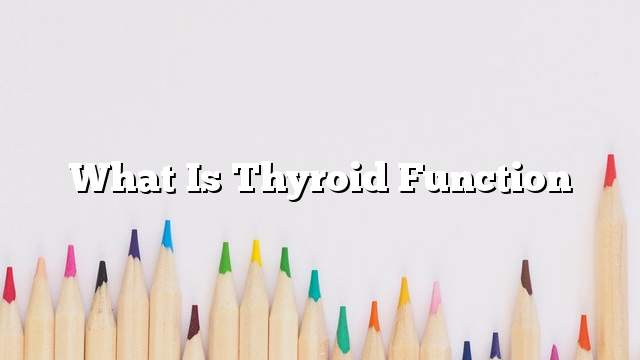Thyroid
Thyroid gland is part of the endocrine system in the human body, which is the manufacture, storage, and secretion of hormones in the blood to reach the cells of the body. The thyroid gland is located in the neck area in front of the larynx. It is shaped like a butterfly. It consists of two lobes, each of which is located on one side of the trachea, connected by a thoracic tissue called Isthmus. This islet may not be present in some people, Separate thyroid gland.
Thyroid hormones
Several hormones are produced and released from the thyroid gland. These hormones are the hormone calcitonin (Calcitonin), the thyroxine (the hormone T4) and the triiodothyronine (T3). The T4 hormone is highly ineffective; it is converted to the most potent and potent T3 hormone by an enzyme that removes one of the iodine atoms in it.
The pituitary gland and the pituitary gland work together. The pituitary gland below the brain produces, stores, and secrete thyroid-stimulating hormone. Its secretion leads to increased secretion of T4 hormone and T3 hormone The thyroid hormone (TSH) means that there is not enough T3 and T4 hormone, and the high level of thyroid stimulating hormone means a high proportion of these hormones.
The role of thyroid in the body
Thyroid gland has many important functions in the human body and summarizes its effect on the various organs of the body and its vital processes in the following:
heart and blood vessels
Thyroid hormones affect every part of the cardiovascular system through the T3 hormone. This hormone increases the strength and speed of the heart’s constriction and its expansion, and reduces resistance to blood vessels, including coronary arteries. Hormones also indirectly affect the cardiovascular system by affecting the autonomic nervous system (Nervous System), its effect on the renin-angiotensin-Aldosterone system, and the effectiveness of blood vessels, etc. .
Metabolic processes
Thyroid hormones are the main regulator of the basal metabolic rate, which in turn is the main source of energy in the human body. The body’s energy consumption at rest is also dependent on thyroid hormones, It is therefore necessary to maintain body temperature.
Thyroid hormones increase the production of adenosine triphosphate (ATP), the main source of energy in most cellular processes in the body, directly and indirectly; it maintains the proportion of ions inside and outside the cells, such as sodium, potassium, Thyroid hormones metabolize, build, and destroy fat, protein, and glucose; affect the production of cholesterol in the body through several mechanisms, and remove it from the body in the form of steroids, or within the bile acids. Thyroid hormones stimulate the secretion of certain substances in the pancreas, which eventually lead to the formation of insulin-producing cells in the pancreas.
Structural muscle
Thyroid hormones affect the contraction and regeneration of skeletal muscles, and the transport of substances through them, increases the flow of calcium ions within them, and increases the proton infiltration through the internal membrane of mitochondria, which stimulates oxidation and energy production in these muscles.
the weight
The change in the proportion of thyroid hormone in healthy people affects the body weight in men and women, even if this change within the normal range and the proportion of the hormone in the body. The people who have a high proportion of the hormone stimulating thyroid is a body mass index ( Body Mass Index has higher, and conversely, people who have a small percentage of this hormone have a lower BMI.
Pregnancy
Thyroid hormones play an important and necessary role during pregnancy. These hormones are essential to the healthy and normal development of the fetal brain and nervous system. In the first trimester, the fetus relies on the thyroid hormones that reach the mother through the placenta and in the twelfth week of pregnancy The thyroid gland almost starts to work alone and hormone secretion.
Calcium and potassium
Calcitonin, which is secreted by the thyroid gland, regulates calcium and potassium in the body. It inhibits the action of osteoclasts, which lead to the transfer of calcium to the bloodstream after it is done. Therefore, inhibition of these cells reduces calcium in the blood, In addition to the role of calcitonin in the re-absorption of calcium through the kidneys, thus reducing the proportion of calcium in the blood more.
Thyroid disorders
Of disorders that may affect the thyroid gland so-called hyperthyroidism (Hyperthyroidism); it increases the secretion of hormones, which leads to an increase in the speed of all processes and functions in the body; and symptoms include increased nervousness, increased sweating, increased heart rate, Hand tremors, anxiety, difficulty in sleeping, hair fragility, muscle weakness, especially muscles in the arms and thighs, loss of weight despite good appetite, and others.
Diagnosis of the initial symptoms may be mistaken. The diagnosis may be confused between the thyroid gland and increased nervousness and tension. The most common form of hypothyroidism is gout or Graves’ disease. The upper eyelid of the eye may have an outward appearance or both. Goiter may also occur, which may cause swelling in the neck area.
A person may also have hypothyroidism, in which the thyroid gland is unable to produce enough hormones. This may occur for a variety of reasons including immunological diseases, the use of certain medications, thyroid inflammation, and many other causes.
The inability to produce sufficient amounts of hormones leads to a decrease in the speed of the body’s vital processes such as the speed of feeling tired, increased dryness of the skin, forgetfulness, depression, constipation, coldness and many other symptoms. The diagnosis is to check the level of thyroid stimulating hormone.
